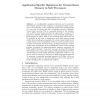Free Online Productivity Tools
i2Speak
i2Symbol
i2OCR
iTex2Img
iWeb2Print
iWeb2Shot
i2Type
iPdf2Split
iPdf2Merge
i2Bopomofo
i2Arabic
i2Style
i2Image
i2PDF
iLatex2Rtf
Sci2ools
111
Voted
ARC
2010
Springer
2010
Springer
Application-Specific Signatures for Transactional Memory in Soft Processors
As reconfigurable computing hardware and in particular FPGA-based systems-on-chip comprise an increasing number of processor and accelerator cores, supporting sharing and synchronization in a way that is scalable and easy to program becomes a challenge. Transactional memory (TM) is a potential solution to this problem, and an FPGA-based system provides the opportunity to support TM in hardware (HTM). Although there are many proposed approaches to HTM support for ASICs, these do not necessarily map well to FPGAs. In particular in this work we demonstrate that while signature-based conflict detection schemes (essentially bit vectors) should intuitively be a good match to the bit-parallelism of FPGAs, previous schemes result in either unacceptable multicycle stalls, operating frequencies, or falseconflict rates. Capitalizing on the reconfigurable nature of FPGA-based systems, we propose an application-specific signature mechanism for HTM conflict detection. Using both real and projected F...
ARC 2010 | Conflict Detection | FPGA-based Soft Multiprocessor | Hardware | Particular Fpga-based Systems-on-chip |
| Added | 02 Sep 2010 |
| Updated | 02 Sep 2010 |
| Type | Conference |
| Year | 2010 |
| Where | ARC |
| Authors | Martin Labrecque, Mark Jeffrey, J. Gregory Steffan |
Comments (0)

